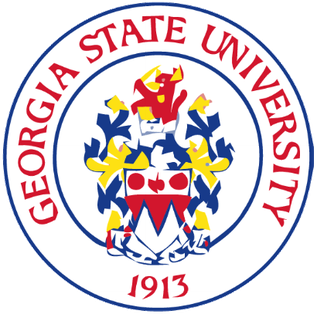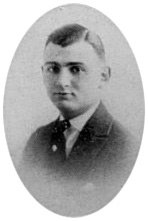Related Research Articles

Georgia State University is a public research university in Atlanta, Georgia. Founded in 1913, it is one of the University System of Georgia's four research universities. It is also the largest institution of higher education by enrollment based in Georgia and is in the top 10 in the nation in number of students with a diverse majority-minority student population of around 54,000 students, including approximately 33,000 undergraduate and graduate students at the main campus downtown.
The University of Alabama is a school with many traditions. This article describes several of these traditions.

The Georgia State University Sports Arena is an indoor arena located in Atlanta, Georgia, United States. It was the home of the basketball teams of Georgia State University from 1973 until 2022 and hosted the badminton competition of the 1996 Summer Olympics. It is the home of Georgia State's women's volleyball team.
"The Nittany Lion" is a traditional fight song played by the Penn State Blue Band at football games and other sporting events. During the pre-game show of home football games at Beaver Stadium, it is part of the traditional Lion Fanfare and Downfield. While it is not the official fight song of Penn State, it is one of the songs most widely associated with the university, and is also incorrectly referred to as "Hail to the Lion". On Fridays and Saturdays, the clock tower in Penn State's Old Main plays a line of the chorus music at the fifteen-minute mark of each hour, and adds a line every 15 minutes until the whole chorus is played on the completion of the hour.

The Georgia State Panthers are the intercollegiate athletics teams that represent Georgia State University, located in Atlanta, Georgia. Almost all GSU teams compete at the National Collegiate Athletic Association (NCAA) Division I level as members of the Sun Belt Conference, a conference of which they were a charter member. Previously, GSU was a member of the CAA, and prior to that, the ASUN Conference.

The Thunder of the East is the marching band of the University at Buffalo in the State University of New York system. UB's first marching band was created in 1920, and disbanded in 1927. It was revived in 1946, increasing in size and reputation until about 1970. It was known as "The Pride of the East." At that time, it was dissolved upon UB's departure from Division I athletics. In 1981, some UB students continued the tradition of playing music at UB's home football and basketball games by forming UB's Pep Band. In anticipation of UB's return to Division I athletics, a marching band was formed in 1999 and named, "Thunder of the East." The band debuted at the University at Buffalo Stadium on September 11, 1999. The Thunder of the East is currently led by James E. Mauck; and performs at UB's Buffalo Bulls home football games, as well as in other musical venues.

"Hail to Pitt" is the most traditional fight song of the University of Pittsburgh, which is commonly referred to as Pitt. The saying "Hail to Pitt!" is also the most traditional and commonly used slogan of the University of Pittsburgh and its athletics teams. The slogan is frequently used in promotional material, printed on merchandise and souvenirs. It was also the title of a 1982 history of Pitt athletics by author Jim O'Brien. The slogan is often used among alumni as a statement of affiliation, including as a closing signature in conversation or correspondence between alumni, and is sometime abbreviated as "HTP" or "H2P", the latter of which is a registered trademark of the university and is frequently used on official university signage and merchandise.

The "Pitt Victory Song", one of the most popular and widely used fight songs of the University of Pittsburgh, is often played in conjunction with "Hail to Pitt" and the "Panther Song". It was originally written by former to students of the university in order to solve the issue of the university not owning the copyright to "Hail to Pitt" which prevented the school from granting permission for its use during football radio broadcasts. Lyrics were written by G. Norman Reis and Louis M. Fushan. Music was written by Benjamin Levant. The song debuted in the Cap and Gown Club's 1938 musical production entitled Pickets, Please! Although commonly performed at university events, few people today know the rarely heard first portion of the song that occurs before the chorus. However, the most common cheer that is used during Pitt-related events and athletic contests is "Let's go Pitt!", which while perhaps derived from the song's lyrics, is often cheered even in absence of the song or music.

"The Orange and Blue" is the traditional fight song of the Florida Gators intercollegiate sports teams of the University of Florida in Gainesville, Florida.

The Georgia State Panthers football team is the college football program for Georgia State University in Atlanta, Georgia. The Panthers football team was founded in 2010 and competes at the NCAA Division I FBS level. The team is a member of the Sun Belt Conference. The Panthers currently play at Center Parc Stadium, about ten minutes from GSU's downtown campus.
The Mountaineer Marching Band, known as The Pride of West Virginia, is the marching band of West Virginia University located in Morgantown, West Virginia. The band was awarded the prestigious Sudler Trophy by the John Philip Sousa Foundation in 1997.

Southern Pride is the name for the marching band of Georgia Southern University located in Statesboro, Georgia.

The Georgia State Panthers men's basketball team represents Georgia State University and competes in the Sun Belt Conference of NCAA Division I. The Panthers play at the Georgia State Convocation Center in Atlanta, Georgia, United States.

The Marching Tar Heels is the athletics pep band for the University of North Carolina at Chapel Hill. Known as "The Pride of the ACC", the Marching Tar Heels is one of the largest organizations at UNC with over 290 students. The band plays at all home football games as well as travels to away games, usually as a small pep band. However, the entire band travels to one away football game each year, usually staying close to home. These have included trips to universities such as NC State and East Carolina but have also included some longer trips to venues such as Notre Dame in 2006 and the Chick-fil-A Kickoff Game in 2010 and 2016.

The Georgia State Panthers baseball team represents Georgia State University in NCAA Division I college baseball. The team currently competes in the Sun Belt Conference. It first began competing there before moving to the TAAC, and the CAA. Beginning July 1, 2013, Georgia State returned to the Sun Belt Conference for all sports. The Panthers play their home games at Georgia State's Panthersville sports complex in the GSU Baseball Complex.

The Georgia State Panthers men's soccer team represents Georgia State University (GSU) in all NCAA Division I men's college soccer competitions. As of the 2022 season, the Panthers play in their full-time home of the Sun Belt Conference (SBC), which reinstated the sport after a one-season hiatus. During the SBC's men's soccer hiatus, GSU had been a single-sport member of the Mid-American Conference. However, following a major conference realignment in 2021 and 2022 brought several new men's soccer schools to the SBC, that league announced it would reinstate men's soccer no later than 2023, eventually moving that date forward to 2022.

The Georgia Southern–Georgia State rivalry, also known as Modern Day Hate, is a college athletics rivalry between the Georgia Southern Eagles and Georgia State Panthers. Both schools are members of the Sun Belt Conference (SBC). For the 2021–22 school year, the men's soccer rivalry temporarily moved to the Mid-American Conference, with both schools joining that league for men's soccer after the SBC disbanded its men's soccer league. However, SBC expansion in 2022 and the addition of three "Power Five" programs led to the reinstatement of SBC men's soccer effective in 2022–23. While the teams have only met eight times in football, the rivalry dates back to the 1970s in basketball and other sports.

The Georgia State Panthers women's beach volleyball team represents Georgia State University in the sport of beach volleyball. The Panthers compete in NCAA Division I as a member of Conference USA (C-USA). The Panthers play their home matches at the GSU Sand Volleyball Complex on the university's Atlanta campus, and are currently led by head coach Beth Van Fleet.

Center Parc Stadium is an outdoor stadium in Atlanta, Georgia. The stadium is the home of the Georgia State University Panthers football team as of the 2017 season, replacing the Georgia Dome which had served as their home stadium from the program's inception in 2010 until 2016.

The 2019–20 Georgia State Panthers men's basketball team represented Georgia State University during the 2019–20 NCAA Division I men's basketball season. The team's head coach was Rob Lanier, who was coaching his first season at Georgia State. The Panthers played their home games at the GSU Sports Arena in Atlanta, Georgia as a member of the Sun Belt Conference. They finished the season 19–13, 12–8 in Sun Belt play to finish in a tie for fourth place. They were the No. 4 seed in the Sun Belt tournament, where they lost to Georgia Southern.
References
- ↑ Sugiura, Ken. "Ga. State hopes to sing different tune with new fight song". Atlanta Journal-Constitution. Retrieved 6 June 2012.
- ↑ Siegel, Robert. "Georgia State Picks A New Fight Song". NPR. Retrieved 3 November 2011.
- ↑ Kirk, Jason (23 August 2010). "Georgia State's New Fight Song" How Atlanta Is It?". SB Nation Atlanta. Retrieved 3 November 2011.